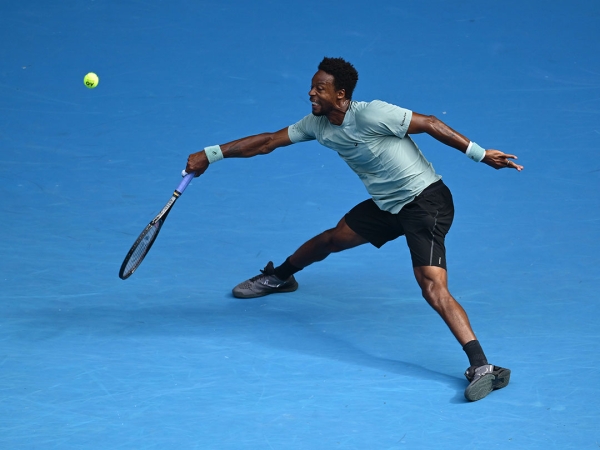If Ben Shelton is still hurling his body around show courts in the second week of a Slam half as well as Gael Monfils at 38 years old, he would be pleasantly surprised.
MORE: All the scores from Day 9 at AO 2025
The 22-year-old was pushed to the limits for nearly three hours against the age-defying French veteran on Monday before a back injury ended Monfils’ charge 7-6(3) 6-7(3) 7-6(2) 1-0 ret.
In his 19th AO campaign and riding an eight-match winning streak following his upset of fourth seed Taylor Fritz, Monfils had high hopes of joining wife Elina Svitolina back in the quarterfinals at Melbourne Park, following her earlier victory on Monday over Veronika Kudermetova.
MORE: AO 2025 men's singles draw
While a boisterous MCA crowd willed on the underdog, Shelton – the 21st seed and a quarterfinalist in his Australian Open debut two years ago – had other ideas.
Neither player could be separated on serve, and after Monfils took the early initiative in the tiebreak, his opponent responded in style with back-to-back aces – one of them a 226km/h bullet – on his way to the opening set.

“Gael is a guy that I’ve watched since a little kid. He has the greatest highlight tape of all time, and you saw some of that tonight,” Shelton said after he secured a quarterfinal clash against unseeded Italian Lorenzo Sonego.
“At 38 years old I hope I’m still walking without crutches. To push me the way that he did today and to entertain everyone in New Zealand and Australia the way he has in the last few weeks is so impressive.
“I hope to be able to create some memories like that with my family watching on at that age because it’s really, really special.”
Following her earlier victory, Svitolina had made it courtside in time to see her husband stretch his body to the extreme.
With a boisterous crowd in his corner, Monfils amped up his aggression to run away with the second-set tiebreak to level the showdown, and pointed to his head as he strode to the chair.
After clinching a crucial third-set tiebreak, Shelton secured an immediate break to open the fourth and at 40-0, Monfils limped back from his team in the corner and conceded the toll on his body had become too much.
Taking a moment to soak in the atmosphere, he stopped on court and thanked the standing ovation.
“It's been a very long tour for me, playing a lot of matches, spending a lot of hours,” Monfils said.
“Of course, some days are tougher. Today was one where I think I was already very close from the limit, and I think I passed it, unfortunately.
“You know, it happens, but I'm still learning, which is good. Learning also takes more experience. Of course, today was tougher for me physically.”
Aware that his opponent had already become the oldest ATP title winner in Auckland before being forced to battle for nine-and-a-half hours just to reach the fourth round, Shelton’s game plan was clear from the outset – to make this battle as physical as possible.
“There’s a lot of things he does unbelievably well – counterpunching, making you feel uncomfortable on the court and getting to net and being able to shorten some of those points,” Shelton said.
“It was really tricky today to do some of that stuff because he was serving so well. I think he's been doing that all week and yeah, there’s a lot of things that make that guy a nightmare to play. I can’t imagine playing him when he was 21 or 22 like me.”
Earlier, in his 26th main draw appearance, Sonego reached his maiden Grand Slam quarterfinal after ending the breakout run of 19-year-old American Learner Tien 6-3 6-2 3-6 6-1.
After the 29-year-old comfortably took the opening two sets, the teenage qualifier did everything he could to make a match of it in the third set, but the tank was running on empty. Tien was ultimately unable to find enough on serve in the fourth to extend his stay.
“Just unbelievable, crazy emotion,” Sonego said. “Today was really tough. I’m so sad because he had some problem and he’s not the right way to win, but I’m so happy to reach the quarterfinal … I'm [high] in confidence right now. I have more experience than my opponent today.
“He's a young player, next generation. Yeah, he needs to improve, and he [will] play more time in this level, for sure. Today I put my experience on court.”

